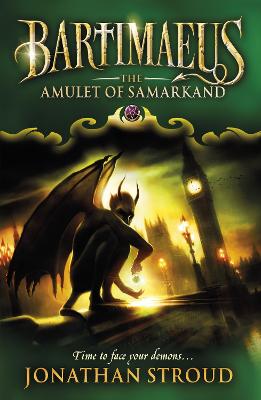
The Amulet of Samarkand is the first title in the New York Times bestselling Bartimaeus series by Jonathan Stroud, author of Lockwood & Co. - a global No.1 show on Netflix.
**Note: There is a chance the book cover you receive may differ from the cover displayed here.**
When a young magician’s apprentice secretly summons an irascible 5,000 year old djinni to do his bidding, neither are prepared for the peril that ensues.
Nathaniel is plotting the downfall of his nemesis – a ruthless magician by the name of Simon Lovelace – and tasks Bartimaeus to steal the powerful Amulet of Samarkand from him, in order to exact his revenge.
But before long, Nathaniel and Bartimaeus are caught up in a terrifying adventure much bigger than either of them anticipated, involving intrigue, rebellion and murder…
Set in an alternate London controlled by magicians, this hilarious and electrifying series will enthral readers of all ages.
Drama, humour and hypnotically engaging storytelling – Independent
A thrilling tale of magic and adventure with deliciously pointed comedy – The Times
- ISBN10 0552562793
- ISBN13 9780552562799
- Publish Date 2 September 2010 (first published 30 September 2003)
- Publish Status Active
- Publish Country GB
- Publisher Penguin Random House Children's UK
- Imprint Corgi Childrens
- Format Paperback (B-Format (198x129 mm))
- Pages 496
- Language English
Reviews


inlibrisveritas
Full review to come.

Amber (The Literary Phoenix)
This series has a world-feel all it’s own. It feels like a bit later than Victorian England, but there’s no element of steampunk. There was a similar aesthetic to Ink and Bone but where that version of the world had fallen apart, this one is tightly held together, like a fine tapestry foretelling doom. The stiffness of the humans (magician or not) is the contrast needed to make Bartimaeus himself so funny. Where even young Nathaniel is very precise and decided, the djinn itself is goofy and sarcastic is it is entirely what I’m looking for here.
Jonathan Stroud’s voice is a YA version of Terry Pratchett or Douglas Addams. He’s dry, certainly, but he’s also sharp and witty. I think this style of humor is one that people either love or hate. Fortunately for me, I love it. There are always runway comments that take me by surprise or make me chuckle. If one were to read this book in its printed form, most the best parts are in the footnotes, which are entirely Bartimaeus’ commentary on the adventure. For us audiobook listeners, the commentary has been inserted into the narrative, and it flows smoothly. Still funny.
I always find it difficult to review books I love and have read many times. Like the Harry Potter series or Artemis Fowl, there’s no longer an element of surprise to the storyline because I’ve read it so many times. Objectively, I will say that the characters are a bit flat, particularly those without a POV. Nathaniel’s master, Arthur Underwood, is as two-dimensional as they come. Simon Lovelace should have layers upon layers, but his motives are trimmed to their barest simplicity. Even Nathaniel is dry, although there is a peek to his potential future in some of the things he says or thinks. In this first book, even Bartimaeus is not as well-rounded as learning his history will make him in better stories (particularly the companion novel, The Ring of Solomon). If someone isn’t into Stroud’s humor and can’t connect with the characters, this book may be a bit of a dud.
Still I loved it. I love the complexities of the magicians’ daily lives and their summoning requirements, and I live for the subtle, historical references that Bartimaeus drops all the times. I particularly love his relationship with the other djinn, Farqual and Jabor. The humor is cheeky and at times out protagonist (definitely Bartimaeus, in my opinion) is a bit immature… but The Amulet of Samakand is a lot of fun to read.
Younger fans of Terry Pratchett’s will get a particular kick out of this one, and it’s squeaky clean. There’s a lot more coming in the series and the plots get more intense after the first book, so if you’re willing to stick with the ride, it’s a great story. For me, this is no challenge at all. This is a nostalgic read for me, and any book that makes me laugh is a win.

Briana @ Pages Unbound
The plot is exciting and moves forward at a decent rate. New developments crop up all the time to keep readers on their toes. Bartimaeus uses footnotes in the chapters that he narrates to add extra information that readers might find of interest without interrupting the flow of the story. (These footnotes are probably one of the better-known aspects of the book.) Who narrates the other chapters is a mystery. They are told from a third person omniscient point of view, but the switch between this and the first person narration is somewhat discomfiting. The book cannot be understood as Bartimaeus’s story, written for posterity or whatnot, but neither can it be accepted simply as a story. Stroud would have done better to have Nathaniel narrate the parts that include him but not Bartimaeus.
Overall, The Amulet of Samarkand was a good read. It presents a nice contrast to works that glorify magic (and even pokes fun at the idea that magicians’ apprentices would all be shipped off to a boarding school together!) Its strength lies in that it is different and critical and unafraid to present a world that is gritty. Fantasy fans will enjoy it.
This review was also posted at Pages Unbound Book Reviews.

Amanda
Nathaniel is somewhat of an annoying brat, and as Bartimaeus has said, too clever for his own good. In this world, magicians don’t actually have their own power, they must summon djinni (or, as Nathaniel’s master calls them: demons) to do their bidding. It is a master-slave type relationship. Nathaniel may be strong for his age and shows a lot of potential, but there are certain aspects of being a magician that he clearly lacks the knowledge of and maturity to deal with these things. Bartimaeus is a wizened (and honorable, as he says) djinni, so we mostly learn the important things from him.
Although Jonathan Stroud’s writing style and word choice is quite nice, it somehow distanced from the story rather than sucking me in. I kept noticing the nice flow and almost flowery or poetic language, but in some ways it reminded me of reading my textbooks – too many big words and your mind starts straying. My mind didn’t actually stray, but I wasn’t able to connect to the story as much as I would have liked, and it was easier to set the book down and come back to it at a later time.
See my review in its entirety here.

celinenyx
The world is well thought-out and the demon lore is interesting. Wonder were that boy is going though.. I prefer Bartimaeus' parts.
